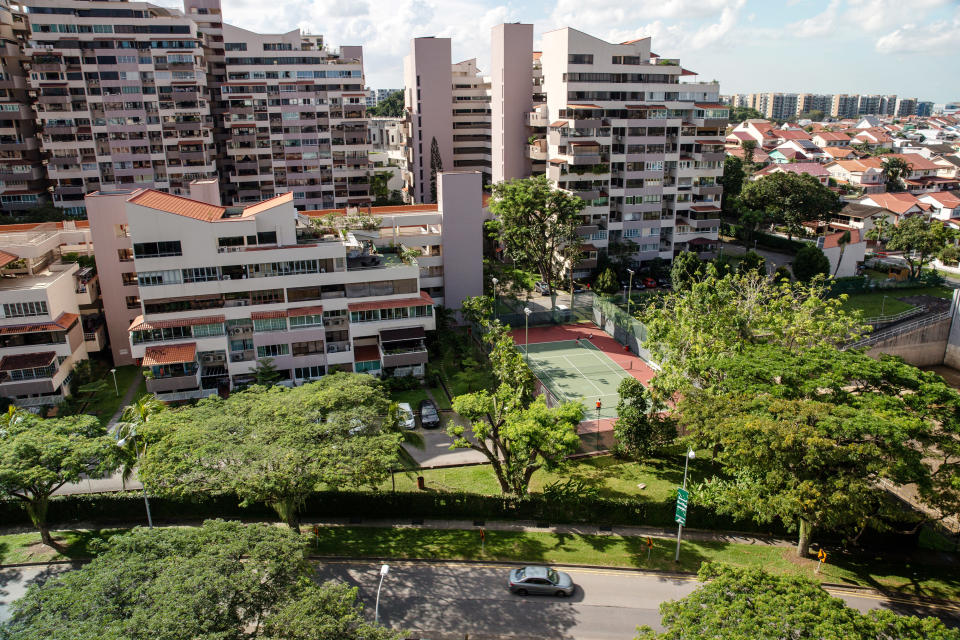COMMENT: Curb Your Enthusiasm for Singapore's Housing Revival

By Andy Mukherjee
What’s not to like about Singapore’s property market?
Sales in 2017 touched a four-year high. Developers paid homeowners S$8.5 billion ($6.4 billion) — the most since 2007 — to vacate their homes so new apartment complexes could be built. Prices have stopped falling, and Credit Suisse Group AG expects them to rise between 5 percent and 10 percent this year. Even Peter Churchouse, a Hong Kong-based guru of all things real estate, is telling readers of his newsletter that one of his favorite property markets is “coming back to life.”
You won’t find proof of life in the rental market, however.
Having fallen 12.5 percent over four years, rents on Singapore residential properties are refusing to rebound. Prices, which have historically moved in near-perfect lockstep, are starting to decouple.
This may be just a lag effect: Rents could catch up. But there are several reasons to believe they may not. For one, a low birth rate, combined with Singapore’s strict controls on immigration over the past few years, compressed the city’s population growth between 2012 and 2017 to a compound annual rate of 1.1 percent, from 3 percent between 2007 and 2012. As the central bank says, at this rate it would take five years for the population to rise by 5 percent, compared with just two years previously.
Depressed wages could also affect demand. As I’ve noted, the monthly household income from work for condominium dwellers in the city-state was enough in 2016 to buy only 1.6 square meters of the median new home. When the market took off the after the slump caused by the 2003 SARS epidemic, that figure was 2.3 square meters — wage earners were a lot richer back then.
Most developed countries are finding it hard to lift wages despite low unemployment, and Singapore is no exception. However, if wages don’t rise, any increase in home prices will make property even less affordable. And that’s going to be a hard sell politically, considering the government may also be toying with the idea of raising the goods and services tax — perhaps as early as next month.
Singapore can always alter the economics of a purchase decision by lowering buyers’ stamp duty.
Yet it may hesitate to do so, because the 3-month interbank rate, the benchmark for mortgages, fell below dollar Libor in October 2016. It’s now heading down again. Put another way, there’s an abundance of money in Singapore; inviting a raft of overseas funds to the island’s property market may not be wise just now.
The city’s monetary authority doesn’t control interest rates. To ease the glut, it would have to allow the domestic currency to strengthen appreciably, so that speculators start fearing a depreciation that would wipe out gains on Singapore dollar assets.
A strong local currency, however, would force down the current 0.6 percent inflation rate by making imports super-cheap, thus further crimping wage earners’ bargaining power. The affordability gap would widen.
Finally, officials won’t turn a blind eye if last year’s feverish pace of so-called en bloc sales — where all condominium owners take cash from builders to leave, permitting redevelopment — continues into 2018.
Those transactions do create new demand (the people whose houses are being bulldozed have to live somewhere), but they also lead to a bunching of supply down the road. In Singapore’s case, that supply jump will come in 2021.
So while the authorities are probably going to be happy with moderate price gains over the next couple of years, they’ll want investors to curb their enthusiasm. If things got too hot too quickly, the government would have to step in more forcefully.
This column does not necessarily reflect the opinion of Bloomberg LP and its owners.
Andy Mukherjee is a Bloomberg Gadfly columnist covering industrial companies and financial services. He previously was a columnist for Reuters Breakingviews. He has also worked for the Straits Times, ET NOW and Bloomberg News.
To contact the author of this story: Andy Mukherjee in Hong Kong at amukherjee@bloomberg.net
To contact the editor responsible for this story: Paul Sillitoe at psillitoe@bloomberg.net
© 2018 Bloomberg L.P

 Yahoo Finance
Yahoo Finance 